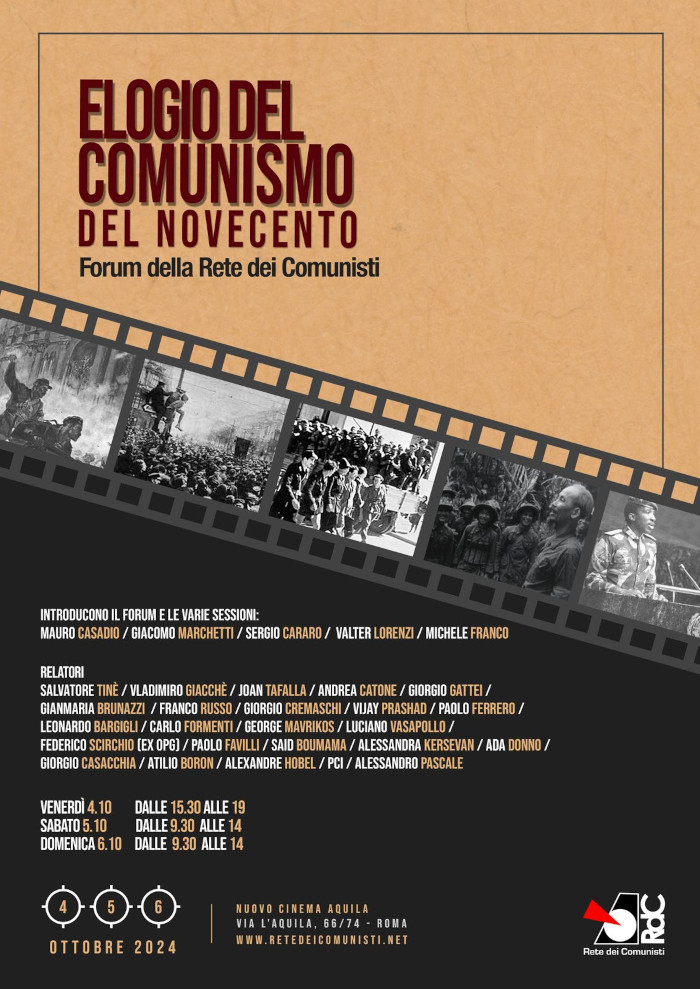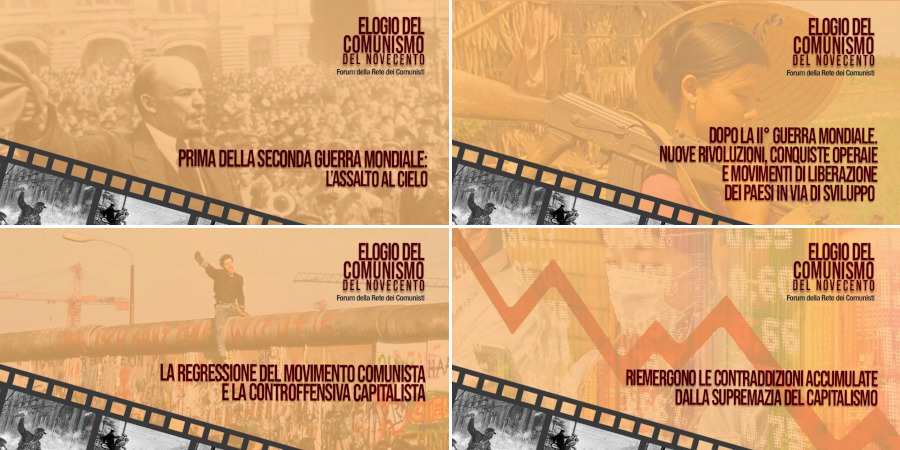| english | español | français | italiano |
Session 1
Before the Second World War: The Assault on Heaven
The period following the October Revolution up to the defeat of the Nazi-fascists was a very hard period marked by millions of deaths in wars and revolutions, but it affirmed on the world stage the birth of a new political and class force that changed the outlook for the whole of Humanity in that century.
Today, the propaganda of the regime and the ideological apparatus of the bourgeois state want to tarnish that achievement and that merit; instead, it is the duty of communist, socialist and even democratic forces to claim that outcome that has prevented us from overflowing again into the climate of war, even nuclear war, in which we find ourselves today for some fifty years.
In the international anti-Nazi and anti-fascist alliance in the Second World War, the role of the USSR was decisive in the victory, and those who today want to downgrade that result do so only because they want to erase from history the worldwide emancipation of the subaltern classes that started with the Bolshevik revolution.
- The October Revolution and the Building of Possible Socialism in the USSR
- The defeat of the 1919 insurrectionary attempts in Europe: Germany, Austria, Hungary; the Red Biennium in Italy.
- The defeat of the Shanghai insurrection in China in 1927 and the beginning of the Long March
- The USSR, the only socialist state in the world. Industrialisation and literacy in an immense backward country
- Internationalism
- The fight against colonialism in Asia and Africa. The Baku Congress
- The resistance against nazi-fascism in European countries
- The defeat of Nazism by the Soviet Red Army
Session 2
After the Second World War. New revolutions, workers’ achievements and liberation movements in developing countries.
This function of political and civil growth continued and was relaunched in the post-World War II period by promoting scientific development up to the 1960s, by supporting the liberation movements against US and western colonialism and imperialism, and by creating the conditions also for the working class in capitalistically advanced countries to advance claims on working, wage and social conditions that led to the birth of Welfare, the Welfare State, which allowed the emancipation of workers from subordination to capital even in the developed West.
This possibility was given not only by the political strength of the communist movement and the military might of the socialist countries, but above all by the possibility of the victory of an egalitarian, fairer social and economic system where class differences were overcome and an advanced popular democracy was envisaged.
- The reconfiguration of imperialism and the emergence of a global imperialist alliance under US hegemony
- The transformation of war in the nuclear age: ‘total war’ becomes obsolete, the ‘cold war’ is born
- Two conceptions of democracy: representative or popular
- Scientific development prevents the nuclear monopoly of US imperialism
- The victory of the Chinese Revolution
- The competition of two economic systems and the birth of the Comecon
- The achievements of the labour movement in the West
- The PCI in the post-war period
- Decolonisation and the Third World liberation struggle
- The victory of the Cuban Revolution
- The Victory of the Vietnamese Resistance
- The Revolution in Europe: Carnation Revolution in Portugal
Session 3
The regression of the communist movement and the capitalist counter-offensive
Despite the important historical role it played in the 20th century, there was a defeat and we must reckon with it. In the decades that separate us from the end of the USSR as a promoter of change, we have set ourselves the problem as Rete dei Comunisti of addressing the causes of the defeat, but we have not been in a position to carry through this theoretical and political work.
Today, in the face of the re-emergence of the capitalist mode of production’s limitations, however, it becomes even more important to investigate those causes because a new revolutionary process will have to resume the interrupted path but will not be able to remove those causes in its analysis on pain of giving breath again to the animal spirits of capital.
Theoretical, political, social, historically located bureaucratic causes that produced the crisis of European Communism, in the East as well as in the West, must be revisited and discussed if only to be aware of the difficulties of a historical transformation that is in any case now being set in motion again.
- The scleroticisation of Marxism and theoretical debate in the USSR and the Western Communist parties
- The rupture between the USSR and China
- The illusion that the ‘final’ capitalist crisis of 1973 was the preamble to its failure as the contradictions of the failure to develop productive forces in both the USSR and China emerged
- Capitalism’s counter-offensive: mystification about democracy and accelerated development of the productive forces. The elaboration of the Trilateral Commission in the mid-1970s
- Capitalist restoration and the neo-liberal offensive of the 1980s
- Political and theoretical evolution of the USSR and European communist parties
- Open crisis in the development of the productive forces in the USSR
- Start of economic ‘reforms’ in China and the failed reforms in the USSR
Session 4
The contradictions accumulated by the supremacy of capitalism re-emerge
Certainly the Communist movement, the countries of Real Socialism, those that still resist or have consolidated can and must be the subject of a historically situated theoretical and political critique, but what is happening in the world today obliges us to review those experiences in the light of the reactionary function of the imperialist countries and the capitalist order.
What emerges is not only again the reactionary character of the current social order, but an economic, social, political, environmental, but also ethical and moral crisis produced by endless development that harms all humanity. The resumption of the possibility of even nuclear war attests to this infinite regression into which the Capitalist Mode of Production is dragging us.
- Capitalism’s Pyrrhic victory after the dissolution of the USSR
- Liberalist hegemony in the globalisation of the 1990s
- The first creaks of globalisation (from Seattle onwards). The inclined plane of capital
- Globalisation creates the material basis for multipolarism
- The season of asymmetrical wars
- The financial crisis of 2007/2008 and the transition from globalisation to global competition
- The fragmentation of the world market and the return of war to the world stage
- The prospect of multipolarism
Introducing the Forum and the different panels:
Mauro Casadio, Giacomo Marchetti, Sergio Cararo, Valter Lorenzi, Michele Franco
Speakers:
Salvatore Tinè – Vladimiro Giacchè – Joan Tafalla – Andrea Catone – Giorgio Gattei – Gianmaria Brunazzi – Franco Russo – Giorgio Cremaschi – Vijay Prashad – Paolo Ferrero – Leonardo Bargigli – Carlo Formenti – George Mavrikos – Luciano Vasapollo – Federico Scirchio (Ex opg occupato) – Paolo Favilli – Said Boumama – Alessandra Kersevan – Ada Donno – Giorgio Casacchia – Atilio Boron – Alexandre Hobel – PCI – Alessandro Pascale.
Call text:
- Elogio del comunismo del Novecento. Un forum per discuterne … e rivendicarselo
- Praise of 20th century Communism: A Forum to discuss it… and reclaim it!
- Éloge du communisme du 20ème siècle : Un forum pour en discuter… et se le réapproprier !
- Presentación del Foro “Elogio del comunismo del siglo XX”


